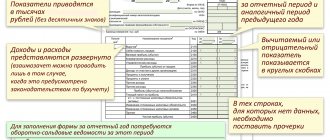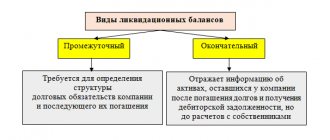Administrative responsibility of an accountant for errors in accounting
In case of gross errors in accounting or improper performance of professional functions, liability is applied to the accountant in accordance with the provisions of the Code of Administrative Offenses of the Russian Federation. In this case, Art. 15.11 of the code, but there is an essential point - the accountant’s guilt must be proven, and the statute of limitations must also be observed.
Responsibility is assigned for any errors leading to distortion of accounting indicators. Also a violation for which administrative liability is provided is the registration of imaginary transactions or objects.
According to Art. 15.11 Code of Administrative Offenses of the Russian Federation, the fine is 5,000-10,000 rubles. If the violation is repeated, the liability becomes significantly stricter - a fine of 10,000-20,000 rubles. or disqualification for 1-2 years.
However, penalties are not applied to the accountant if the accounting indicators were distorted:
- through the fault of other persons who compiled incorrect primary documents;
- due to the fact that other persons did not transfer primary documents to the accounting department.
Example of calculating a fine
Let's consider how a fine is calculated for a gross violation of the rules for accounting for income and expenses.
Example
As part of the on-site inspection conducted by the Federal Tax Service in November 2022, documents were requested from Virage-S LLC. During the inspection, it turned out that the person being inspected was missing a number of documents: for the counterparty LLC Privoz - two invoices for January of the current year, for the counterparty LLC Lenta - one certificate in form KS-3 for March of the current year, for the individual entrepreneur Vasiliev - two invoices for April of this year. In addition, the fact of understating the tax base for profits in the amount of 55,000 rubles was revealed. and income tax not paid to the budget - 11,000 rubles. (RUB 55,000 × 20% [tax rate in 2021]).
These circumstances led to tax authorities imposing penalties of 10,000 rubles on Virazh-S LLC. and 2,200 rub. (RUB 11,000 × 20%). The first fine is for the absence of a primary tax, the second is due to an understatement of the tax base.
In total, the total amount of sanctions imposed on the company amounted to 12,200 rubles.
Administrative liability for errors in tax accounting
If an accountant violates the provisions of tax legislation, he is also liable under the Administrative Code. The most common liability under Article 15.5 is for failure to comply with deadlines for submitting tax reports (declarations and calculations). The fine is 300-500 rubles.
In addition, for failure to provide or failure to report information that is required for tax control, as well as refusal to submit it, the Federal Tax Service Inspectorate applies penalties to the employee under Art. 15.6 Code of Administrative Offenses of the Russian Federation - 300-500 rubles.
For failure to submit annual accounting reports and audit reports to the Federal Tax Service, penalties are established under Art. 19.7 Code of Administrative Offenses of the Russian Federation. They amount to 300-500 rubles.
In the 1C: Reporting service, after sending the reports, the accountant receives a notification that the electronic document has been received by the body accepting the reports. If it suddenly happens that the document you sent does not meet any requirements, you will receive a notification within 8 hours about the refusal to accept the document.
If a document, for example, a declaration, meets the requirements, the tax office checks it and no later than the next day sends you through a service, for example 1C: Reporting, a receipt of refusal or acceptance of your reporting. We strongly recommend that you monitor these notifications, since 1C: Reporting automatically generates and sends notifications about the results of the reception. If you suddenly receive a refusal to accept reports, the document flow will end and the service will color it red.
Liability is also possible under Part 1 of Art. 15.3 of the Code of Administrative Offenses of the Russian Federation for 500-1,000 rubles. It is used if the deadlines for sending an application for registration to the Federal Tax Service were violated.
If the taxpayer does not comply with the legal requirement of the Federal Tax Service specialists, he will be punished under Art. 19.4 of the Code of Administrative Offenses of the Russian Federation in the amount of 2,000-4,000 rubles.
Misstatement of financial statements: liability
Failure to comply with record keeping requirements entails punishment provided for by the Tax Code of the Russian Federation and the Code of Administrative Offenses of the Russian Federation. We are not talking about isolated or insignificant errors, but serious violations that entail significant distortions.
Article 15.11 of the Code of Administrative Offenses of the Russian Federation lists a number of consequences that resulted from a gross violation of accounting requirements. These include:
- maintaining accounting accounts without reflecting business transactions in synthetic accounting registers;
- acceptance for accounting of fictitious primary documents drawn up for non-existent transactions, reflection in accounting registers of unreal accounting objects;
- generation of reporting not based on accounting data;
- understatement of taxes by 10% or more;
- distortion of any indicator in accounting records by 10% or more;
- the company lacks accounting registers, reporting and a mandatory auditor’s report throughout the entire storage period established for such documents.
The fine for incorrect accounting and other violations specified above for an official (chief accountant or manager, if he keeps records himself) ranges from 5 to 10 thousand rubles. If similar incidents are detected again during the year, then the repeated fine will be from 10 to 20 thousand rubles. In particularly serious cases, the accountant may be disqualified for a period of 1 to 2 years.
In addition, for failure to submit accounting records to the Federal Tax Service within the established deadlines, sanctions are provided for:
- officials - a fine of 300 to 500 rubles. (Article 15.6 of the Code of Administrative Offenses of the Russian Federation);
- companies - fine 200 rubles. for each document (Article 126 of the Tax Code of the Russian Federation).
Disciplinary liability of an accountant
According to Art. 192 of the Labor Code of the Russian Federation, disciplinary liability is divided into reprimand, reprimand and dismissal. These measures apply to all employees, incl. and accountants.
In addition, the employer can terminate the employment contract with the accountant and on an additional basis - the employee’s lack of professionalism, as a result of which the company suffered damage. This point is indicated in clause 9, part 1, art. 81 of the Labor Code of the Russian Federation - the employer has the right, on his own initiative, to terminate the employment contract in connection with the adoption of an unfounded decision by the chief accountant, if because of it there was a violation of the safety of property, its unlawful use or other damage to the company’s property.
Financial responsibility of an accountant
The accountant is subject to financial liability, incl. and for errors in accounting. It arises if the employer has suffered direct actual damage.
According to Art. 238 of the Labor Code of the Russian Federation, the accountant must compensate for the damage to the company, due to which there was a decrease in property or money.
However, the accountant is an employee, and therefore he does not bear financial responsibility for tax violations. The Ministry of Finance in its Letter No. 03-04-06/42105 dated August 22, 2014 explained that an administrative fine paid due to the fault of an employee is considered damage to the company, and therefore it has the right to demand compensation from the employee. But a fine issued for a tax offense committed by an accountant cannot be considered damage to the company.
A fine is a measure of liability for improper fulfillment by a taxpayer of its obligations. The taxpayer is the company itself, and not its hired employee - the accountant.
The company bears responsibility for tax violations, for example, failure to meet reporting deadlines or failure to pay taxes. The accountant is not obliged to compensate her for fines for tax offenses committed. For example, this is stated in the Appeal ruling of the Moscow City Court dated March 26, 2019 No. 33-13062/2019.
Example
The accountant incorrectly calculated the salary and paid more than was necessary. Accordingly, the employer received material damage, because money was spent improperly.
The employer can recover damages from the accountant, but only within the limits of the employee’s average monthly earnings. To do this, the manager must issue an appropriate order. In other cases, the employer will have to compensate for the damage through the court.
This option occurs if a liability agreement has not been signed with the accountant. Then according to Art. 241 of the Labor Code of the Russian Federation, the damage caused is compensated, but only within the limit of the accountant’s monthly salary. In order to be able to demand full compensation for damages, you need to sign an agreement with the employee on full financial liability.
1C ITS Support Kit is a set of services and useful services that guarantees the relevance and functionality of the program, round-the-clock support, ease of use in 1C, as well as access to a dozen reference books, including the “Legal Consultations” section.
Is there a fine for violating the procedure for recording income and expenses?
Yes, such a fine is provided for in Art. 120 Tax Code of the Russian Federation. She lists the following as gross violations of the rules for accounting for income and expenses:
- repeated untimely and incorrect reflection of business operations, accounting objects of the company in its accounting registers, on accounting and reporting accounts (twice or more during the calendar year);
- lack of primary;
- lack of accounting and tax registers;
- no invoices.
IMPORTANT! The invoice does not belong to the primary documentation, so it was separated into a separate position. The Tax Code of the Russian Federation does not stipulate what is the primary document. The definition of this concept is given in Art. 9 of the Law of December 6, 2011 No. 402-FZ “On Accounting”. The primary forms used by the company are approved in the accounting policy and are its application.
Read more about accounting policies in the article “Ready-made accounting policies - a sample for an organization.”
Please keep in mind that according to Art. 120 of the Tax Code of the Russian Federation, you cannot be fined for errors in tax reporting (Resolution of the Federal Antimonopoly Service of the North-Western District dated November 19, 2007 No. A42-3678/2006). If such errors lead to a distortion of the tax base, the fine will be under Art. 122 of the Tax Code of the Russian Federation.
A ready-made solution from ConsultantPlus will help you reduce the fine due to mitigating circumstances. If you do not already have access to this legal system, a trial demo access is available for free.
Civil liability of an accountant
The Civil Code provides for liability in the form of recovery of damages - for this purpose Art. 15 and 1064 of the Civil Code of the Russian Federation.
If arrears arise, tax officials file a claim against the manager or chief accountant, which requires recovery of damage caused to the budget due to non-payment of tax payments.
In such proceedings, the defendants are the manager and the chief accountant, since after the tax audit, but before filing this claim, they can be held criminally liable under Art. 199 of the Criminal Code of the Russian Federation for non-payment of taxes from the company.
Criminal liability of an accountant
If a taxpayer evades paying taxes or insurance contributions, and also fails to fulfill his duties as a tax agent, criminal liability is provided.
According to Art. 199, 199.1, 199.4 of the Criminal Code of the Russian Federation, the chief accountant can be brought to justice if there is evidence that he intentionally took part in the commission of a crime. In addition to this, it is necessary that the taxpayer has arrears of taxes or contributions in a large amount (from 5 million rubles) or in a particularly large amount (from 15 million rubles).
When committing a crime for the first time, it is possible to be released from criminal liability. But this requires paying the entire debt, as well as fines and penalties.
It is quite difficult to hold the chief accountant accountable for this type of responsibility, since there are difficulties in proving the intentionality of actions to evade paying taxes. It is necessary to prove that there was criminal intent, and not an accounting error due to an insufficient level of qualifications.
Commentary to Art. 15.11 Code of Administrative Offenses
Accounting statements are a unified system of data on the property and financial position of an organization and the results of its economic activities, compiled on the basis of accounting data in established forms. In accordance with the Federal Law “On Accounting”, accounting is an orderly system of collecting, registering and summarizing information in monetary terms about the property, obligations of an organization and their movement through continuous, continuous and documentary accounting of all business transactions. The objects of accounting are the property of organizations, their obligations and business transactions carried out by organizations in the course of their activities. The main tasks of accounting include:
— generation of complete and reliable information about the organization’s activities and its property status, necessary for internal users of financial statements - managers, founders, participants and owners of the organization’s property, as well as external users - investors, creditors and other users of financial statements;
— providing information necessary for internal and external users of accounting statements to monitor compliance with the legislation of the Russian Federation when the organization carries out business operations and their feasibility, the availability and movement of property and liabilities, the use of material, labor and financial resources in accordance with approved norms, standards and estimates ;
— preventing negative results from the organization’s economic activities and identifying internal reserves to ensure its financial stability.
Within the meaning of this article, an administrative offense is a gross violation of the rules of accounting and presentation of financial statements, expressed in the distortion of the amounts of accrued taxes and fees by at least 10 percent, or in the distortion of any article (line) of the financial reporting form by at least 10 percent.
According to Art. 120 of the Tax Code of the Russian Federation, a gross violation of the rules for accounting for income and expenses and objects of taxation is understood as:
a) lack of primary documents, or lack of invoices or accounting registers;
b) systematic (twice or more times during a calendar year) untimely or incorrect reflection in the accounting accounts and reporting of business transactions, cash, tangible assets, intangible assets and financial investments of the taxpayer.
At the same time, in accordance with Part 2 of Art. 13 of the Federal Law of November 21, 1996 N 129-FZ “On Accounting”, a tax return is not included in the list of elements of the financial statements, but is an independent document - a written statement of the taxpayer about income received and expenses incurred, sources of income, tax benefits and the calculated amount of tax and (or) other data related to the calculation and payment of tax (Part 1 of Article 80 of the Tax Code of the Russian Federation).
Thus, distortion of the amounts of accrued tax indicated in the tax return should be considered as an act constituting an administrative offense under Part 1 of Art. 15.6 of the Code of Administrative Offenses of the Russian Federation “Failure to provide information necessary for tax control”, the sanction of which is softer (from three hundred to five hundred rubles) in relation to the sanction of Art. 15.11 Code of Administrative Offenses of the Russian Federation (from two thousand to three thousand rubles).
In this case, the judge can decide the issue of reclassifying the actions of an official from Art. 15.11 Code of Administrative Offenses of the Russian Federation on Part 1 of Art. 15.6 of the Code of Administrative Offenses of the Russian Federation, since the elements of these articles have a single generic object of encroachment, and also taking into account the correlation of sanctions of these articles, we can conclude that such reclassification does not worsen the position of the person against whom a case of an administrative offense has been initiated. Also taking into account the provisions of Part 1 of Art. 23.1 of the Code of Administrative Offenses of the Russian Federation, this requalification will not entail a change in the jurisdiction of consideration of this case.
Bringing to responsibility for an administrative offense under Art. 15.11, a specific official, it is necessary to take into account the subjective side of the offense. From the subjective side, this violation is characterized by guilt in the form of intent, that is, the official must know and realize that he is violating the basic requirements for accounting and reporting, wants it or is indifferent to the established requirements for accounting. Very often, courts do not attach importance to the characteristics of the subjective side of an administrative offense, which leads to the issuance of decisions that do not comply with the provisions of the Code of Administrative Offenses of the Russian Federation. It is necessary to take into account the provisions of Article 1.5 of the Code of Administrative Offenses of the Russian Federation, from which it follows that the obligation to prove the guilt of the offender lies with the entity conducting the proceedings in the case of an administrative offense, and irremovable doubts about the guilt of the person brought to administrative responsibility are interpreted in favor of this person. And when establishing the guilt of an official in a gross violation of the rules of accounting and presentation of financial statements, the court must analyze in detail the responsibilities of specific officials reflected in the orders and instructions of the organization, the failure or improper execution of which resulted in the commission of this administrative offense.
When bringing to administrative responsibility under Article 15.11 of the Code of Administrative Offenses of the Russian Federation, in decisions on the imposition of administrative punishment, the courts must indicate which rules of accounting and presentation of financial statements were violated, and must contain references to specific norms of the legislation on accounting.
When considering cases of this category, courts often make mistakes in determining the appropriate subject of administrative responsibility. In accordance with the Resolution of the Plenum of the Supreme Court of the Russian Federation of October 24, 2006 No. 18 “On some issues that arise for the courts when applying the Special Part of the Code of the Russian Federation on Administrative Offences” when deciding on the issue of bringing an official of an organization to administrative liability under Article 15.11 of the Code of Administrative Offenses The Russian Federation must be guided by the provisions of paragraph 1 of Article 6 and paragraph 2 of Article 7 of the Federal Law of November 21, 1996 N 129-FZ “On Accounting”, according to which the manager is responsible for the proper organization of accounting, and the chief accountant (accountant under absence of a chief accountant position on staff) - for maintaining accounting records, timely submission of complete and reliable financial statements. It is also necessary to take into account paragraph 4 of Article 7 of the Federal Law of November 21, 1996 N 129-FZ “On Accounting”, according to which in case of disagreements between the head of the organization and the chief accountant on the implementation of certain business transactions, documents on them can be accepted for execution by written order of the head of the organization, who bears full responsibility for the consequences of such operations.
If accounting in an organization is carried out on the basis of a civil contract by third parties who did not provide information necessary for tax control, or provided it in violation of the deadline established by law, or grossly violated the rules of accounting and reporting, then this the circumstance does not relieve the head of the organization from administrative liability provided for in Articles 15.6 and 15.11 of the Code of Administrative Offenses of the Russian Federation, since in accordance with Articles 6 and 18 of the Federal Law of November 21, 1996 N 129-FZ “On Accounting”, it is he who is responsible for organizing accounting .
Accountant's responsibility after dismissal
The accountant bears administrative responsibility for the mistakes that he made when he worked in the company, that is, he was an official. Is it possible to hold him accountable after his dismissal, since he is no longer an official?
The answer is yes, you can. Even in a situation of dismissal, the accountant is not released from administrative liability if mistakes were made by him while performing professional duties for a given employer. But there are statutes of limitations for bringing this liability to justice, and they are specified in Art. 4.5 Code of Administrative Offenses of the Russian Federation.
Summarize. The preparation and presentation of accounting and budget reports is an important stage in the work of an accountant. In order for the reporting to be reliable, it is necessary to keep records in compliance with legal norms, carefully reflect information on the financial and economic activities of the institution on the accounting accounts, and verify the compliance of the accounting (budget) data with the indicators of the reporting accounting forms. Distortion or incorrect reflection of data in reporting, including incomplete reflection, may be recognized as an offense falling under the Code of Administrative Offenses of the Russian Federation.
You can purchase services that help you work as an accountant here.
Do you want to install, configure, modify or update 1C? Leave a request!
Did you like the article?
Want to receive articles like this every Thursday? Keep abreast of changes in legislation? Subscribe to our newsletter
Significant errors
Corrections to the annual financial statements are made only for significant errors. These are errors that can lead to a distortion of the overall picture of the financial and economic situation of the company and lead to the adoption of incorrect management decisions by the founders.
The organization establishes how to determine the significance of an error in its accounting policies. You can, for example, write: “an error is considered significant if its value distorts the indicator of any line of the report by more than 10%.”
To correct, all financial reporting indicators must be recalculated under such conditions as if the detected error had never been committed. This method is called the retrospective recalculation method. Firms that maintain simplified accounting have the right not to use the retrospective method of recalculation.
Let's take a closer look at typical errors in financial statements.
Balance Sheet Inconsistency
The balance sheet data as of the 1st day of the reporting year does not coincide with the last year’s balance sheet data as of December 31 of the previous year.
If you have identified a significant error in the previous reporting year, you need to correct it in the current reporting period.
Corrections are made in accordance with clause 9 of the Accounting Regulations “Correcting errors in accounting and reporting” (PBU 22/2010):
- it is necessary to make a correction to the relevant accounting accounts in the current reporting period in correspondence with account 84 “Retained earnings (uncovered loss)”;
- comparative financial statements for the current reporting year must be recalculated as if the error of the previous reporting period had never been made (retrospective restatement).
Incorrect disclosure of debt
If an organization is indebted to a counterparty, an accountant may mistakenly “offset” these amounts and present the balanced result in the reporting as receivables or payables. This cannot be done. The balance sheet must reflect detailed information about the company's assets and liabilities based on analytical accounting data.
Error in reflecting short-term and long-term indicators
When preparing annual reports, questions may arise regarding the correct qualification of loans that are concluded for several years.
In accordance with paragraph 19 of PBU 4/99, according to the maturity date in the balance sheet, liabilities are divided into short-term (with a maturity date of no more than 12 months after the reporting date) and long-term (other liabilities).
If there are no more than 12 months left until the loan obligations are repaid, the loan payables are reflected in the balance sheet as part of short-term liabilities.
If the terms of the agreement provide for the payment of interest simultaneously with the repayment of the loan itself at the end of the agreement, the obligations are also considered short-term. Debt for interest payments is initially considered short-term if there are no special features regarding the timing of interest payments.
Lack of provision for doubtful debts
Absolutely all companies, including small businesses, are required to form reserves for doubtful debts. If there are grounds for creating reserves for doubtful debts, the amount of reserves must be included in financial results in the event that receivables are recognized as doubtful. The basis for recognizing a debt as doubtful are two conditions:
- the debt is overdue (with a high probability of being overdue);
- the debt is not secured by guarantees.
All types of doubtful accounts receivable, including advances paid to suppliers, as well as loans issued, must be reserved in the balance sheet.
There is a debt with an expired statute of limitations
The company’s obligation is to write off receivables and payables for which the statute of limitations has expired.
There is no correspondence between the indicators of the financial reporting forms
Compliance of indicators of reporting forms to monitor the correctness of filling out the balance sheet and verifying the correctness of accounting. This is an important procedure that completes the preparation of financial statements.







